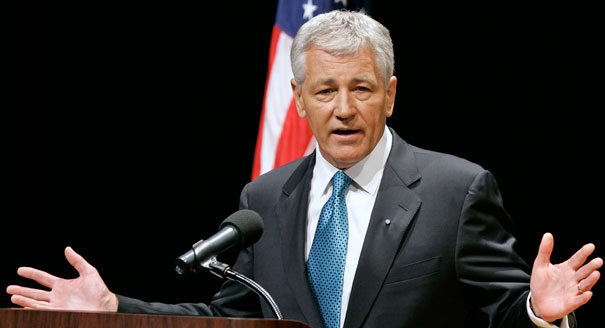US Defense Secretary Chuck Hagel headed to Israel on Sunday in a weeklong trip to the Middle East that will be dominated by worries over Iran’s nuclear program and Syria’s raging civil war.
In his first trip to the region since taking over as Pentagon chief nearly two months ago, Hagel planned to discuss with his counterparts the final details of an elaborate $10 billion arms deal that will provide US military aircraft and missiles to Israel, Saudi Arabia and the United Arab Emirates.
In a two-day visit to Israel, Hagel will seek to counter criticism from some US lawmakers and pro-Israel groups that he is too soft on Iran and too hostile to the Jewish state — a charge he has vehemently rejected.
Hagel will likely tout the arms deal as a demonstration of Washington’s commitment to Israel’s security and as a way of countering Iran’s military power and nuclear ambitions.
The United States and Israel have disagreed over the urgency of the threat posed by Iran’s nuclear program, with Washington maintaining there is still time to see if tough sanctions and diplomacy persuade Tehran to change course.
Hagel is due to tour the Yad Vashem Holocaust memorial in Jerusalem and meet Israel’s Defense Minister Moshe Yaalon, President Shimon Peres and Prime Minister Benjamin Netanyahu, officials said.
His trip to Israel comes a month after President Barack Obama visited Jerusalem and reaffirmed US backing of Israel while promoting fresh attempts to revive Israeli-Palestinian peace talks.
After Israel, Hagel will travel on to Jordan, Egypt, Saudi Arabia and the United Arab Emirates.
Under the unusual US arms package announced Friday, which was negotiated simultaneously with Israel, Saudi Arabia and the UAE, the United States plans to sell advanced missiles to the Saudis and more than two dozen F-16 fighter jets to the United Arab Emirates.
With the Gulf states anxious over Iran’s nuclear and missile programs, the Pentagon has agreed to billions of dollars of arms sales designed to bolster the Arab nations’ air power and missile defenses.
Hagel’s visit coincides with growing suspicions that Syria may have used chemical weapons in its fight against opposition forces. Both Britain and France have submitted evidence to the United Nations alleging the regime fired chemical agents.
US intelligence agencies are taking the reports seriously but have to verify if the Syrian government employed some its deadly chemical arsenal, officials say.
The US administration, reluctant to provide arms to the Syrian rebels, has made clear its skeptical view of military intervention. Obama however has warned the Damascus regime that resorting to chemical weapons would constitute a “red line.”
Hagel announced last week that he had ordered more US troops to Jordan to help prepare for a range of scenarios in Syria, including securing chemical weapons or handling a spillover of violence from the conflict.
The deployment of a US Army headquarters element brought the American military’s presence in Jordan to more than 200.










